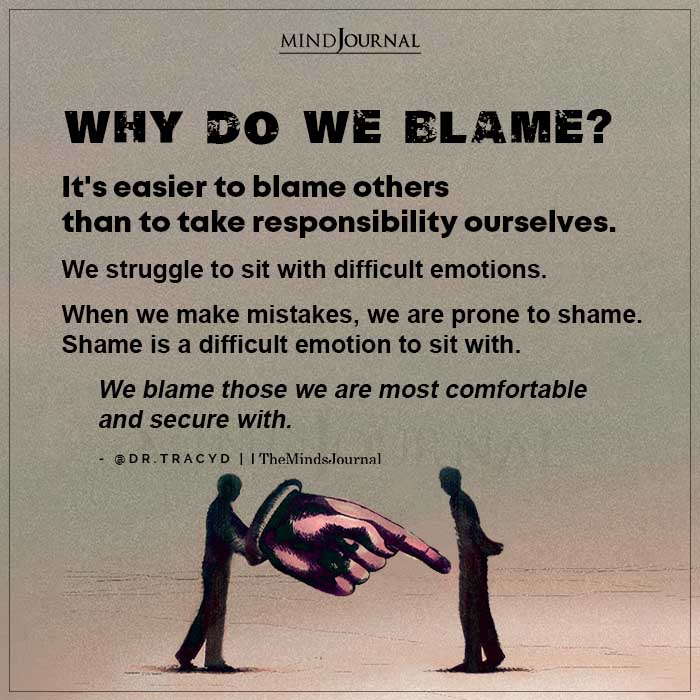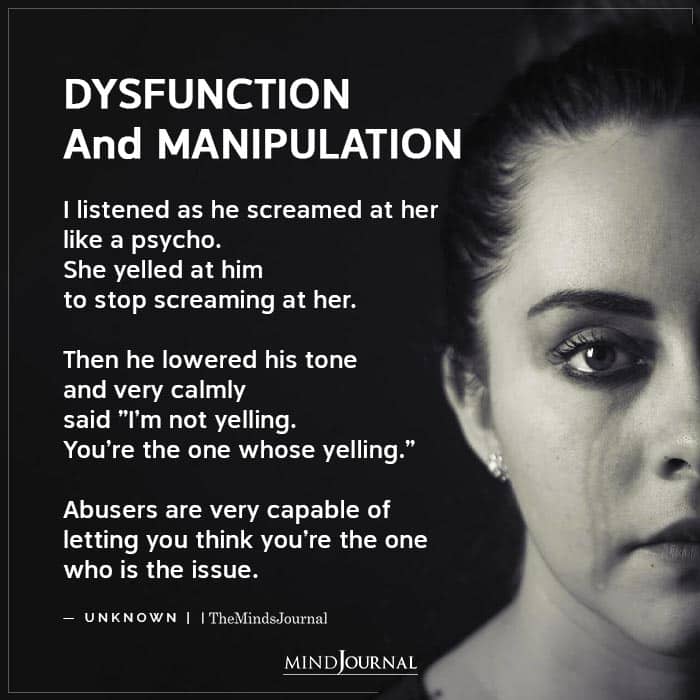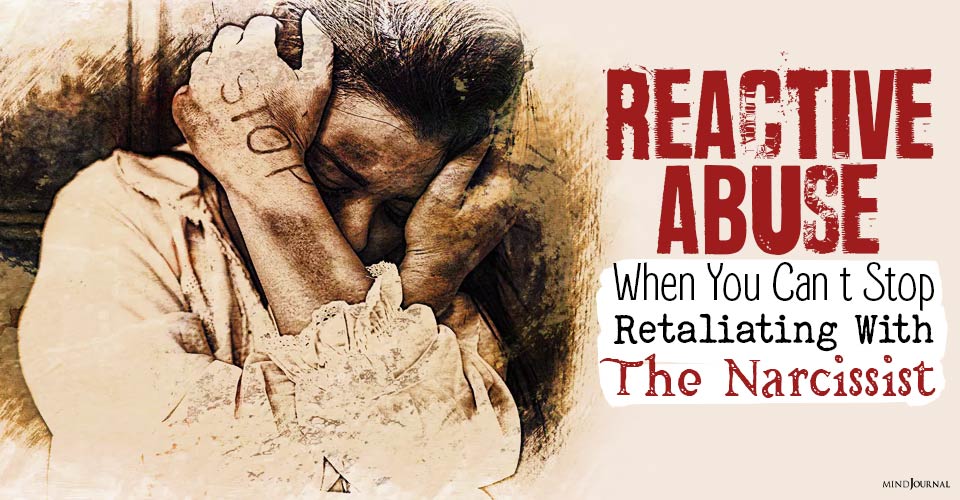When you are a victim of reactive abuse, it’s very easy to judge and shame yourself for behaving in the exact same way as your abuser. Carrying the burden of reactive abuse is a lot, and you don’t deserve it.
When you’re around someone toxic you’re being traumatized. This person treats you unfairly and accuses you unjustly – it feels senseless and deeply damaging.
They are triggering your greatest fears and insecurities. The toxic narcissist is keeping you in a state of anxiety, feeling like you’re going to lose love, security, and the ability to even survive what’s happening to you.
This abuse will eventually provoke horrible, emotional reactions that make you feel sick and under threat. You’ll lose your temper and may even physically lash out and retaliate against your aggressor … when this happened to me, I became a mental screaming lunatic banshee. I couldn’t even recognize the person I’d become!
Today I will teach you in simple and direct terms how NOT to react emotionally to the narcissist’s taunts. I also explain how to protect yourself, so they don’t cause you to unravel ever again by using your reactions against you.
They’re after A-grade narcissistic supply, so go ahead and watch the video or read the transcript to learn how to stop giving it to them and instead find your path to liberation and freedom.
Want to know more about what reactive abuse is? Check this video out below!
I want to speak to the horrible, emotional reactions that you can have to the narcissist’s abuse. When you feel like you can’t stop reacting – things like the guilt of this, the repercussions of this, how the narcissist uses this against you, and how to inoculate yourself against having such emotional reactions in the future.
If you’re new to my YouTube channel, please like and subscribe so you receive all the notifications of my new releases.
Related: What Is Reactive Abuse? Everything You Need To Know About Reactive Abuse
When You Are Around Someone Toxic You Get Sick
We’re going to start off by talking about when you are around someone toxic, you get sick. Let’s get clear on this, of course, you’re going to get sick.
You’re being traumatized because what is happening is senseless, unfair, and it’s completely unjust. You’re being accused of doing things, and of being a person that you couldn’t even imagine thinking of being, let alone actually doing those things.
Your greatest fears and insecurities are being triggered. The narcissist is keeping you in a state of anxiety. You’re feeling like you’re going to lose love. You’re going to lose security. You’re going to lose the ability to be able to maybe even survive what’s happening to you.
You don’t need to be on a literal battlefield, dodging physical bombs and distractions to suffer the consequences of being on an emotional battlefield. You can feel like you’re fighting for your life, your Soul, and everything that is dear to you.
And these are the basic foundations, the absolute foundations of feeling solid, whole, and at peace. They’re really four things – love, approval, security, and survival. All of these things are under threat, and the fabric of yourself, and your relationship with yourself, life, and others are being compromised.
Right now, I want to give you a hug if you are on this battlefield, and you’re still in a battle with a narcissist. I want to give you a hug. I want you to say to yourself, “Of course, I’ve been triggered, and I’ve retaliated.” I want you to tell yourself that you forgive yourself because you were trying to survive.
Now let’s breathe deeply and put this into perspective. Can you negotiate with madness? Can you sit down, have an adult mature conversation with a toxic person, and come to an agreement that makes sense? That is a win-win, and is healthy for everybody involved?
Related: Reactive Abuse: They Call You Abusive for Reacting To Their Abuse
No, of course, you can’t. Because you can’t, you feel like you’re going crazy because it really is like trying to wrestle a crocodile to the ground and have it play nice. It’s impossible. I know you’ve tried this. I know you have. You’ve tried to have conversations before you get to the point where you are literally snapping and losing your mind.
You may not have had all of the skills necessary for empowered boundaries with toxic people, so the narcissist knew exactly where to disarm you. In normal day life, you don’t need this level of perfection within your boundaries.
A narcissist puts you into emotional triggers of anger, despair, fear, or injustice, and then knows how to spin it against you by making out that you are the disordered person, and all the issues are your fault. Now we could go over all of the details ad nauseam.

I don’t want to do that in this particular video … such as trying to dissect every conversation, to try to work out what happened, because I promise you, I want to take you to a deeper level today, because that’s not your way out of that.
Rather, I just want to make this really simple. In war zones with toxic manipulators, it’s unhealthy, it’s emotionally dangerous, and they trigger you into fear and pain. Then they use that, which is your emotional reaction, as the bullets against you.
Of course, you’ve popped because your back is up against the wall. Of course, you’re going to lash out in ways that are not the person you would be unless you were put into that position. I know you may have really questioned yourself and said, “Well, what if I’m the narcissist?”
The very fact that you are here and watching videos like this means that it’s highly unlikely that you are the narcissist because you are wanting to look at this. You’re wanting to look at yourself in this situation.
You feel bad about going off, losing your temper, and even physically lashing out and retaliating, because you’re wanting to look at it and you’re feeling bad about it, which means you are definitely not a narcissist.
A narcissist doesn’t feel bad about their bad behavior for one very specific reason, they don’t care about other people. They don’t care about humanity, healing, transforming their lives, or changing. Yet you are seeking that. Therefore, you’re definitely not a narcissist.
I promise you, in the past, I looked in the mirror, and I couldn’t even recognize the person I’d become – I was a screaming lunatic banshee. That’s how it appeared to be. I despised myself because I thought I was mental, and I thought I was the person he told me I was.
Now, as a result of Thriver healing, I make no apologies for this journey. What I went through and what unfolded – I’ve forgiven myself for it and I’ve healed from this. I now know how to do things differently in the face of abusers, trying to disarm, spin things back, trigger me, offset responsibility, and turn the blame back on me.
I know how to be impervious to this. So, apart from validating your experience and letting you know what really is happening to you, I want to give you these steps.
Related: How to Overcome Reactive Anger and Frustration
How To Not React Emotionally
So, how do you not react emotionally? Please know that narcissists go for the vulnerable places within you because they know that this is going to have a maximum impact. They’re not like normal people. Normal people don’t want to hurt people, and they don’t want to trigger them. They don’t want to experience their wrath, their despair, or their negative energy.
However, narcissists actually feed off it. It’s triple A-grade narcissistic supply. They know, by going after your vulnerable places how derails you. They know it drives you crazy. They know it gets you to react in crazy ways.
That actually allows them to spin the blame, divert attention away from them and what they’re doing, and it can unravel you to the point that they can position you as the enemy, not only to vindicate themselves but to also paint this picture to others, as well as control you even more through your guilt and shame regarding what you did.

These are the reasons that you must get control of this. So that the narcissist can’t use your reactions against you anymore.
So, how do you reverse this? When a narcissist is aiming straight at the exact place within your emotional being which is going to get triggered … well, first of all, it’s about looking at the bigger picture here. You realize what is happening, that this is actually a plot to undermine you and to get you to react because that’s exactly what it is.
Really accept and know that your salvation doesn’t lie in changing the narcissist’s version of you. You’re never going to be able to do that. You are always going to be the narcissist’s scapegoat. Nothing is ever going to change that. They’re always going to blame you for it – it’s never going to change, no matter what you do.
So let go. Detach. Stop trying to bring justice to the situation by fighting back. Rather, take space, get away and go within, and shore up, and heal up that target within you that can be attacked by this person, their minions, and those that they’ve enlisted to do abuse by proxy against you.
Now, I want you to think of this metaphor because it’s powerful. You are at war against vicious weapons. You yourself don’t have vicious weapons, and you don’t want to get involved in a dark war with vicious weapons where nobody wins and everything gets destroyed, poisoned, and obliterated.
It’s a war you can’t win. So you leave the battlefield, and you create your environment with such reinforcement and power that it can’t be infiltrated again. Then you move on to create your reality of love, truth, integrity, wholesomeness, and powerfulness from this space. Then the dark war for you ceases, and your True Self and life can unfold and begin to be rebuilt and then flourish.
That’s your goal. It happens from within. It’s the healing up of all of your triggers that the narcissist used to go after. You remove the targets so that none of the weapons can land.
Then when they try to, there’s no energetic charge on them anymore. There’s no need to retaliate, push back, or fight, which previously was the blood in the water feeding the shark. Narcissists are parasitical energy. They need your fear and pain to get energized and to power them up. Without it, without that necessary energetic currency, the narcissist has nothing left to fight you with.
Related: 5 Techniques To Heal Your Emotional Triggers
The Gift Of The Wakeup Call
So let’s have the gift of the wake-up call of you retaliating in ways that have shocked you. I know that you freaked yourself out, just as I did, with how badly you’ve reacted. But you know what? It’s a good thing. Because it helped you want to stop doing this.
That’s what the path to coming inside to stop this is all about. This is not about merely cleaning up and feeling guilty. It’s definitely not about thinking you’ve done wrong by the narcissist and that they’re right, and you are mental and crazy. Rather, this is about knowing how to get out of toxic relationships and a life that isn’t working.
That inner healing is needed to break free from this so that you can get straight, clear, and solid within your knowing of who you are, and how other people’s opinions and tactics are not your reality if they’re toxic.
In no way does your version of self rely on their version of you. You no longer have to try to stay with them and force them to change their opinion of you, to know a healthy version of yourself. This is the Thriver work. This is the path to your liberation and freedom.
I hope today has really helped. That it has helped release you from the guilt and the shame, and really set you straight about what’s going on here, and how this is a call to your freedom, your evolution, and your healing.
Please share this with anybody who you know can help.
Written By Melanie Tonia Evans Originally Appeared On Melanie Tonia Evans











Leave a Reply